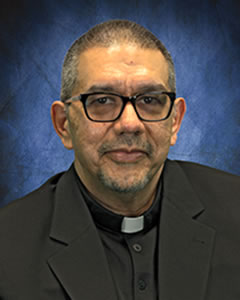
From the Director
My first contact with people who professed a non-Christian faith was on the Pine Ridge Reservation in South Dakota. I had done a summer experience and encountered those who still practiced the traditional ways of the Lakota Sioux people. The most vivid memory was participating in a Sun Dance ceremony. The purpose of the Sun Dance ceremony was to reunite and reconnect with the earth and spirits. It calls for a renewal of life and a prayer for life. In the ceremony I attended, there came a moment of great prayer and the raising of the tree. However, the community misjudged the raising of the tree, and it fell over. There was a hush in the crowd. As people mingled around and quietly talked about the next steps, I was called over by an elder. As I was walking towards him, I came across the tree and felt the urge to jump over it instead of taking the longer trek of going around it. Suddenly, I recalled the words of Fr. Roger Shroeder, SVD, a professor of Intercultural Studies and Ministry in my seminary. He had been a missionary in Papua New Guinea. He was explaining his participation in a somewhat similar ceremony with the native peoples there. At one point, someone asked him to hand a towel over. He took the towel and tossed it over the ceremonial pit to the person. This was a no-no. Because of his actions, the women could not partake of the meal after. Obviously, Fr. Roger felt bad but the people assured him that they knew he meant no harm. Fr. Roger than said these words of wisdom, “that experience taught me a lot. Since then, if I was in a new culture with a different faith, and if I came into a situation where I didn’t know what to do, I would consider what I would do in my home culture than do the opposite. I discovered this worked about 75%.” With that insight, I stopped myself from walking over the fallen tree and took the longer walk around. After, I was told that people were watching me and were relieved that I didn’t walk over the tree. Although I know that I would have meant no harm, and I was unaware of their ways, one still needs to have caution and respect when we enter another’s holy ground.
Although I know that I would have meant no harm, and I was unaware of their ways, one still needs to have caution and respect when we enter another’s holy ground.
In the creation stories of Genesis (chapters 1 and 2), God creates heaven and earth and all in it. The Spirit of God is in all living creatures. Hence, all cultures have the spirit of God in them. Different faiths and religions can have seeds of God’s spirit. Furthermore, Abraham’s son with Hagar, Ismael, is promised a great nation by God. “God heard the lad [Ismael] crying; and the angel of God called to Hagar from heaven and said to her, ‘What is the matter with you, Hagar? Do not fear, for God has heard the voice of the lad where he is. Arise, lift up the lad and hold him by the hand, for I will make a great nation of him.” (Genesis 21: 17-18) Ismael is considered a forefather and prophet of the Islamic faith. In the New Testament, Jesus praises the faith of non-Jewish people such as the Syrophoenician woman (Mark 7:29), the Roman centurion (Matthew 8: 10-11), and the Samaritan leper (Luke 17: 16-19). There is a tradition of respecting another’s path and faith.
As missionaries we often come into contact with others of another faith. In the past, a missionary paradigm was to convince the other that they needed to convert to our faith. Sadly, most of that history is marked with coercion and war. Today, there is a value to see the spirit of God in another’s faith. To make friendships and share with one another as Jesus did in the Gospel. If conversion comes about, it is a result of friendship and love, not force. Our model is Moses’ first encounter with God on Mount Horeb when God told Moses, “Do not come near here; remove your sandals from your feet, for the place on which you are standing is holy ground.” (Exodus 3: 5)